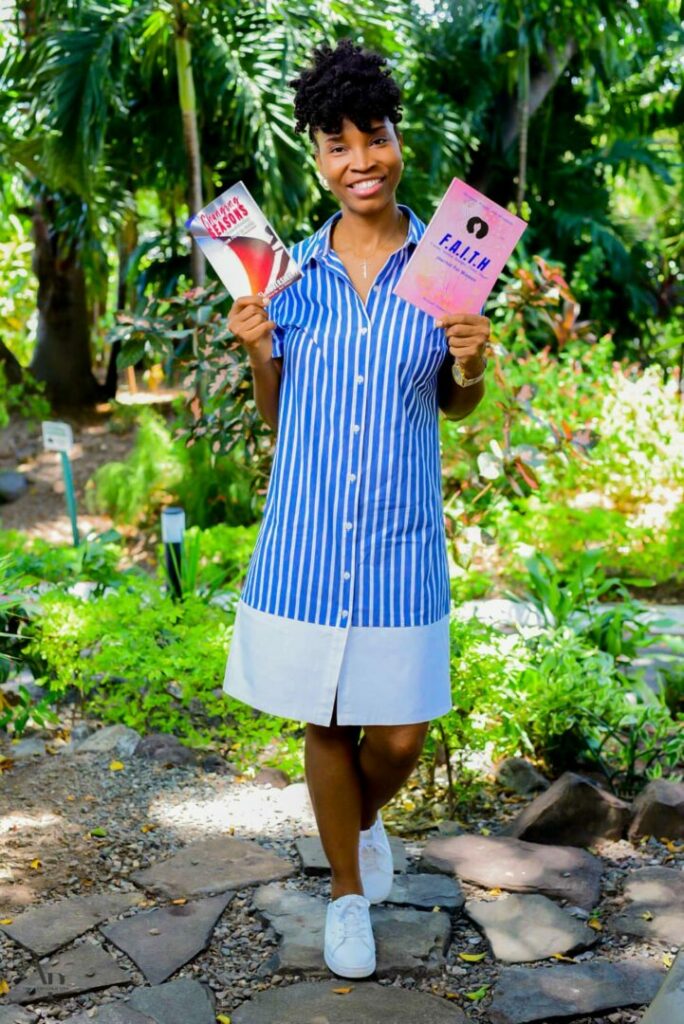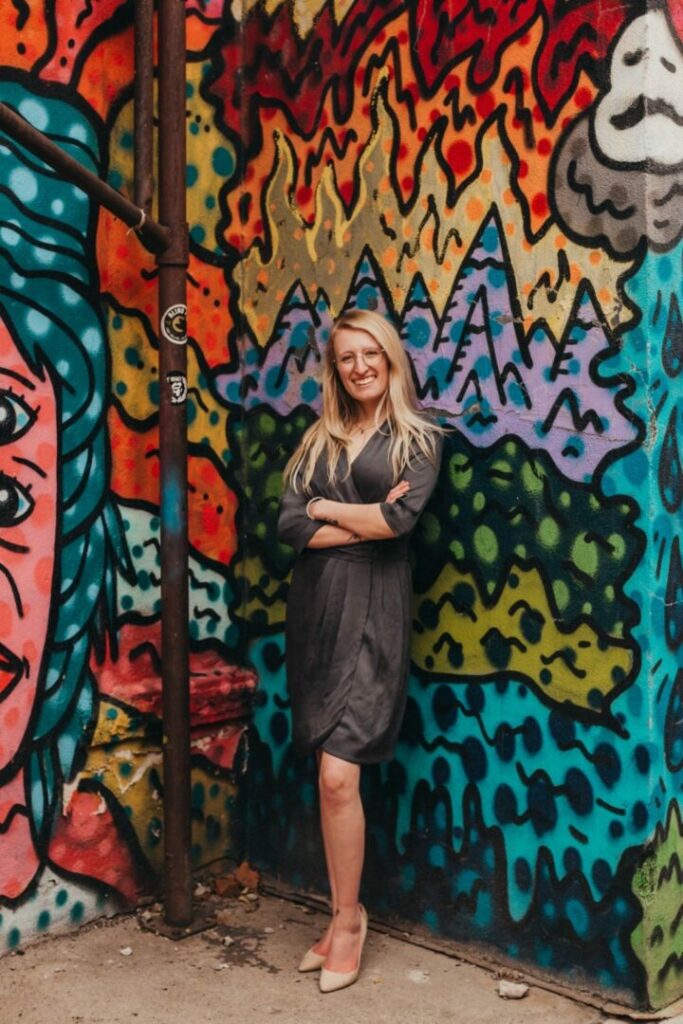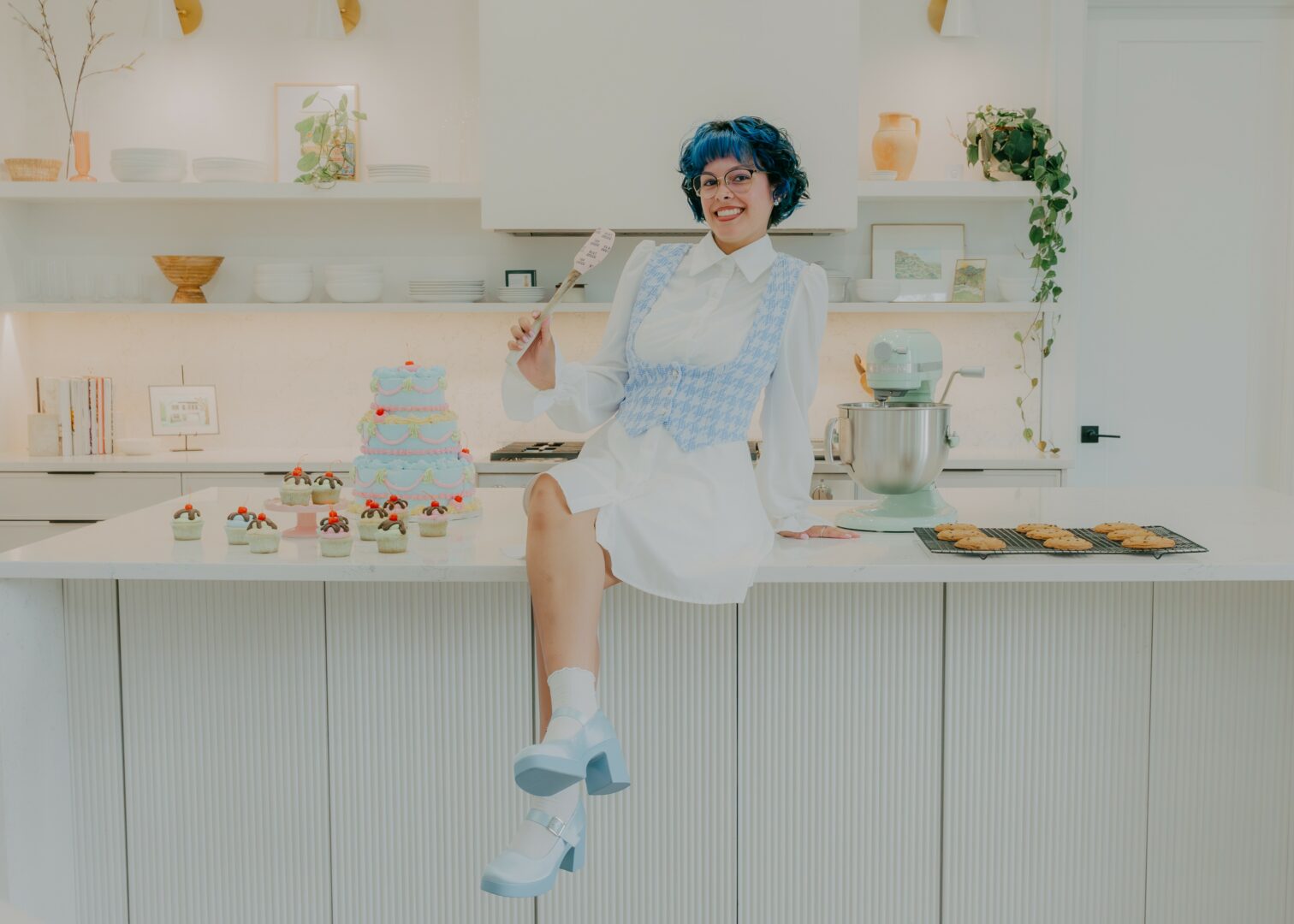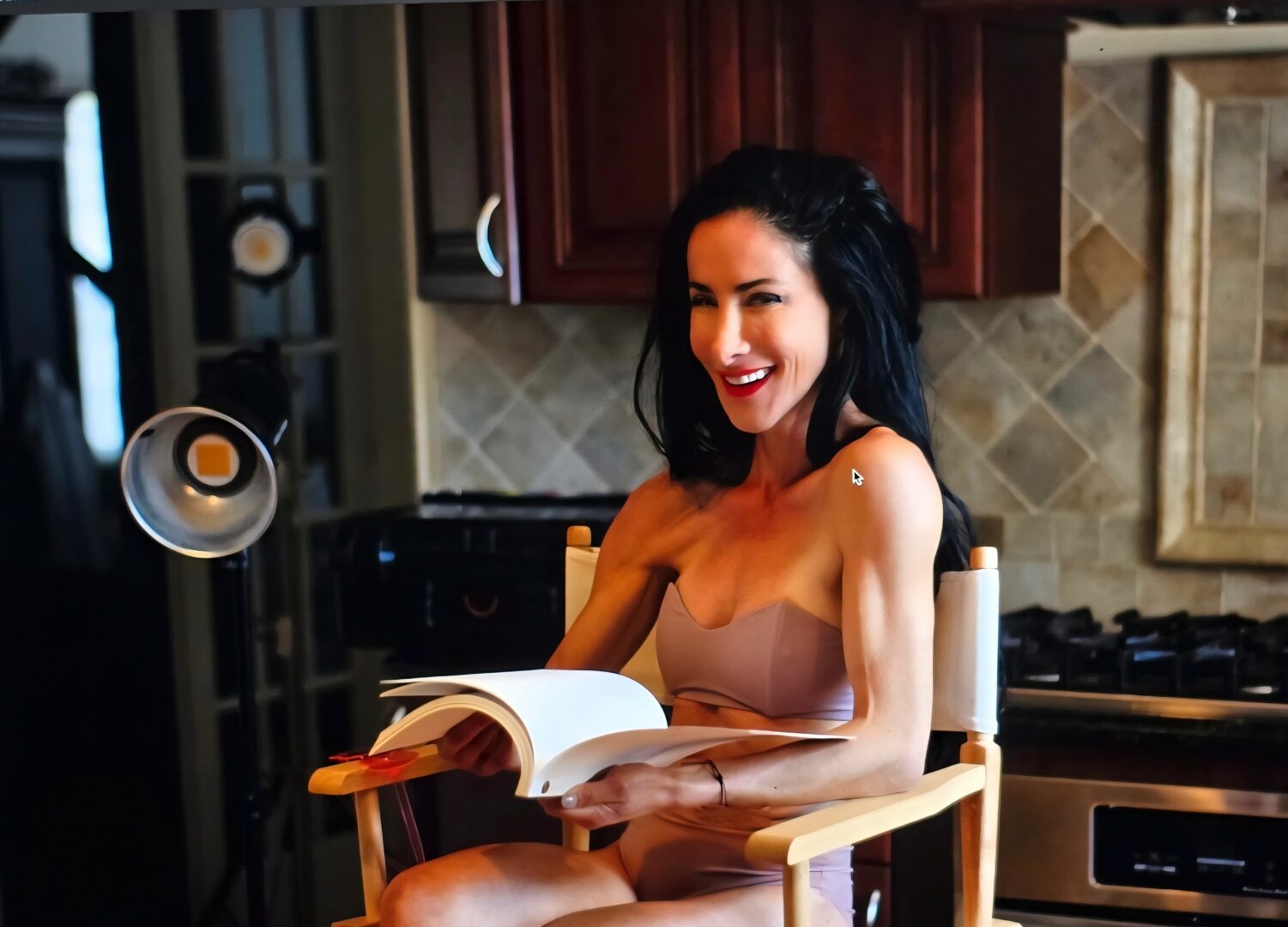We’ve got some of the most incredible artists, creatives and entrepreneurs in our community and we are constantly shocked by how prevalent imposter syndrome is. So many incredibly talented folks are haunted by self-doubt by a society that often tells you not to think too highly of yourself, but in order to have the strength to take on big challenges and make meaningful change in the world you’ve got to believe in yourself and so we wanted to create a space for conversations around overcoming imposter syndrome.
Darian Locklear

Imposter syndrome is sneaky because you reverse psychology yourself into somehow believing you are inadequate. Imposter syndrome is a psychological phenomenon that cause people to doubt their abilities and accomplishments even when they have evidence of success. Truth be told I think most of us have experience this at one time or another. If I’m being really transparent, I experience it regularly. 8 years into the industry and there’s still moments, days, opportunities that I feel under-qualified for. Here’s the reality, we all start under qualified, in all areas of our lives. The only real way to become qualified is through experience. So My advice, walk through the doors that don’t seem like they could have possibly opened for you, EVERYTIME time you start to experience imposter syndrome, note it as a checkpoint of growth that you have entered new territory. Read more>>
Megan Parker

To be completely honest, I don’t feel like I totally have. I see so much talent out there and I am just awestruck and think I’m nowhere near in their league. But then I get a piece of phenomenal feedback from a client, or someone reaches out because they’re impressed with my work and I remember I’m pretty decent at what I do haha. The times that I feel like I’m just “faking it until I make it” have been some of my best learning experiences as they push me to learn a new skill or try something out of my comfort zone. In my line of work the trends are always changing and new techniques are constantly popping up so I don’t know that I’ll ever reach “expert level” and I’m fine with that. The journey is in the ride! Read more>>
George Jonathan

There’s something peculiar about being asked if I’ve ever felt like an impostor, as if the mere absence of this supposedly universal anxiety might itself be a kind of fraud. I watch others wrap themselves in the comfortable blanket of this shared affliction, this collectively agreed-upon neurosis, and wonder if my inability to relate makes me more or less authentic. The idea of pretending to be something I’m not exhausts me more than any actual failure could. I’d rather stand here, gloriously unburdened, in the simple truth that tomorrow will demand exactly what today did: nothing more or less than what I am willing to give. Read more>>
Brit Varrow

Wow. These were all such great prompts. My brain wants to answer them all, and realized they very much inform one another. I think that in itself is pivotal to who I am, always instinctually connecting the data points, telling the story. I think we all do this in our own way. I hope my perspective reveals or brings something of value to you. The prompt I ultimately chose to guide this conversation: “How did you Overcome Imposter Syndrome?” Read more>>
Racquel Ambersley

As a child, I faced significant academic challenges, often wondering why I struggled to grasp certain concepts while my peers excelled. Imagine a 12-year-old who couldn’t even spell her middle name, Ann-Marie, and who had to repeat a grade three times because I failed the exam necessary to advance. This experience was the foundation of my battle with imposter syndrome. I frequently doubted my capabilities and avoided trying new things. Read more>>
James Wignall

Imposter syndrome is something that we all go through at some point, it’s as inevitable as death and taxes. It’s hard to overcome, but what I found really helps is speaking to work colleagues and peers. Hanging out with like-minded folks who you can swing ideas around. In turn, they’ll also ask you what your thoughts are on their ideas, the relationship becomes symbiotic. This will give you and your work validation, getting rid of any notion of the preposterous imposter syndrome. Read more>>
Kristy Flynn

Imposter syndrome can be very debilitating if you listen to it long enough. To be able to overcome it you have to chip away at the fear, the self doubt, the feeling you’re in way over your head.
Imposter syndrome can creep up on you at any given time, during any given project; so I don’t think you overcome it completely. You rather work through it whenever it decides to show up.
Practice positive reassurance by saying “I can do this”, “I have the talent”, “I am strong enough”, or some other words of encouragement. For me, I am an artist that works in paint and I have to tell myself it’s only paint. It can be removed or repainted if I should mess up. Remember perfection does not exist and the flaws are what make things unique. Read more>>
Haj

Imposter Syndrome is a funny thing. I’m not entirely sure where it comes from, but over the years, I’ve learned that many of us experience it. After working with hundreds of writers and creators to help them adapt their work for film and television, I’ve come to realize that most of us simply lack trust in ourselves, and that’s when Imposter Syndrome takes over. Read more>>
Jamie Laskie

Imposter syndrome is something I’ve navigated since starting in mortgages at 19. Being young in the industry, I was surrounded by seasoned professionals, which made me question if I truly fit in. Over time, I learned that I didn’t need to be perfect; I just needed to strive to be 1% better each day and embrace my imperfections. Knowing I’m loved and supported has been grounding. Read more>>
Annie Rich Thompson

Truthfully, I still experience imposter syndrome regularly. The key is not letting it’s voice impact my efforts as an artist. That can be such a challenge! Spending more time in creative community and fellowship with other artists has helped me grow into my artistic identity and to take up space as an artist myself. I would also say that time and practice in my art forms has helped me overcome worries of being an imposter and to feel more comfortable sharing stories from what I have learned through my art journey with confidence. Read more>>
Heidi Harger

I am not sure I have overcome imposter syndrome. I but certainly won’t let it win. It is a daily fight. I put my best foot forward to feel productive and to feel that I am working towards my goals. I am running a marathon not a sprint. So I will continue to work towards my goals and that right there will keep thoughts of being an imposter away. Read more>>
Heather Snaman

For me, overcoming imposter syndrome isn’t so much about conquering it as learning to dance with it. In my career, and especially in my volunteer and advocacy work, I’ve often felt like I’m just flying by the seat of my pants. I’m scrappy and thrive in a dynamic environment, but there are definitely times when I look around the room and feel like everyone else seems more ‘adulty’ (as Queen of To Do founder Kate and I would say) or that others belong in a way I don’t. Read more>>
Audrey Hector

Imposter syndrome is like a relentless, shapeshifting monster that first visits you as a child and continues to haunt you throughout adulthood. It begins as a whisper in your ear or a lurking shadow, always casting doubt on your worth and making you feel like a fraud at every corner. As you grow older, the monster evolves—sometimes appearing as self-doubt, sometimes as anxiety or perfectionism—constantly shifting forms and tricking you into believing that no matter how much you accomplish, you’re never truly enough. However, over time, you learn that this monster, while persistent, doesn’t have to define you or dictate your decisions moving forward. The more you face it, the more you begin to recognize its tricks. Read more>>
Mika Stutzman

I’m not sure imposter syndrome ever fully goes away but rather, it comes and goes in waves. When you start out in a new career field, you fake it til’ you make it, and that’s exactly what I did when I started Harbor Balloons. I booked any client that came my way with any sort of balloon request. Read more>>
Glory St. Germain

Overcoming imposter syndrome was not an overnight transformation for me; it was a deeply personal and evolving journey that started from the moment I dared to dream bigger than my doubts. As a music teacher, author, and course creator, I constantly grappled with that nagging feeling of unworthiness. Questions like, Who would listen to me? Who would ever want to learn from my work or use my books? Played on repeat in my mind, like an unwelcome soundtrack that held me back. Read more>>
Paris Heinen

When I left my job at Weight Watchers and launched my own Health and Wellness Coaching business, I faced a tough battle with imposter syndrome. One of the biggest challenges was charging what I was truly worth. I reached out to other entrepreneurs, who offered invaluable advice. First, they reminded me that I had 20 years of experience in the weight loss industry—I knew my field inside and out. I understood the journey because I live it; having lost 65 pounds myself, I walk the walk. Read more>>
Kim Magers

I managed to overcome imposter syndrome by finally discovering my niche and realizing that this is something I’ve always loved and feel meant to do. The only person who could hold me back is myself, and I care too much about my dreams to let them fade away. I learned to stop comparing my journey to others and accepted that everyone grows at their own pace—it’s not a race! It was important for me to understand that we’re all unique, and no one can do what you do in quite the same way. Read more>>
Eon Easel

I think imposter syndrome is something that is very easy for artists to feel. Especially in todays artistic and musical landscape. There have been plenty of times where I feel inadequate or don’t feel my own full confidence as a musician due to a number of different external factors that really at the end of the day didn’t matter all that much. I’ve learned over time that the only opinion on my music that matters is mine. My own love of music and the confidence that I have knowing that I’ve put the time in technically and creatively to craft my art is what assures me in my own creative journey. I’ve seen my own progress being true to my craft and that is something no one can take away from me. It fuels me to become even better and to see how far my love for music can take me. Read more>>
Lawrence Pizzi

Born in a family of over-achievers, failure was never an option. But as life goes, failure is all around us, and we need to understand how to accept it without letting it affect us too much. I was lucky enough to work in a company where 4 times a year we would be evaluated by our boss, the owner (it was his name on the company and in all the clothing), and by our peers. I remember being tough on my self, but being very compassionate with everybody else. This was executed during a company lunch that took all afternoon and ended up into a dinner. Being a team exercise, I was quickly confronted with praises and even envy towards my “nothing is impossible” attitude, the owner praised my ability to source zippers during a major supplier’s worldwide strike. Read more>>
Abigail Goodin

Tackling Imposter Syndrome has been a pernicious cycle in my life which has honestly never fully gone away. Little fragments of my imposter self like to creep up on me to psych me out right before I do something bold and brilliant, and I think that says far too much of the nature of being a woman in a world that is terrified for her to take risks and create her own opportunities. As much as I wish I could say I overcame imposter syndrome with therapy, validation, success, overcoming imposter syndrome was really just a matter of practice. Read more>>
David Ruzicka

I’m not sure you ever completely get over impostor syndrome — you just do a better job of compartmentalizing it and not letting it get in your way. That’s been the case for me, at least. Even as I’ve progressed in my career and had my skills validated at higher levels, the same outward confidence has never come naturally. It’s a muscle, I guess. To answer the question, then, what I’ve learned over the years is to stop thinking about “myself” at all in creative situations and focus on the work — how to better listen to collaborators. How to bring the inherent truth of a story out into the open. How to get lost in a particular subject, theme, or engrossing world. Read more>>
Kristeen LaBrot-Widmyer

Dealing with imposter syndrome has definitely been a journey. I focus on my wins, even the small ones, to remind myself that I bring something unique to the table. Honest feedback from mentors and colleagues helps too—it’s a good reminder that no one has it all figured out. And I’ve learned not to compare myself to what I see on social media—real life is rarely as perfect as it looks online! Read more>>
Reevacris Jelynne Lasam-Hernandez

I have overcome imposter syndrome by trusting my unique passion and vision. Every challenge I have faced has shown my learned skills and creativity that makes Panadera 757 special. Instead of doubting myself, I let my dedication to authentic Filipino flavors and Filipino-inspired artisanal baked goods and customer happiness speak for itself. I leaned on feedback from customers and kept growing from each experience, showing that I’m not just “good enough” – I am exactly where I’m meant to be. I have not just overcome imposter syndrome; I’ve transformed it into a driving force, turning self-doubt into self-esteem and building something truly nostalgic and memorable for others to enjoy in the form of baked treats. Read more>>
Amaris Davidson

I’ll never forget being on the set of How I Met Your Mother in full makeup, full wardrobe, yet silently praying that they didn’t find out that I was a fraud, a fake, an imposter. In truth, I had gone through the entire audition process and booked the role, which is why it was so weird that these feelings came rushing in so brazenly. When I first reflected on the experience, I don’t think I knew the phrase Imposter Syndrome, so I did what I always do when I don’t know something. I Googled it. When I read the definition, I knew immediately that this was not my first brush with Imposter Syndrome. I thought back to my first ballet class in college and being physically incapable of gliding across the floor for fear that everyone would know that I had never taken a dance class or auditioning for my first collegiate play, booking it only to lose my voice the week before opening from the sheer panic that the audience would know I was a self-taught singer. Don’t worry it came back, but the Imposter Syndrome stuck around well into my career as a professional, always older than my counterparts, model. Read more>>
Karya Schanilec

Overcoming imposter syndrome is something I work on overcoming everyday. But I try to focus on my track record, what I have accomplished, and who has trusted me and my talents. Read more>>
Nina Welp

To be honest, I have not overcome imposter syndrome, but it is something I think about a lot and struggle with as a business owner. Due to my perfectionism I tend to downplay my accomplishments because I am always thinking of ways that I could further improve. Read more>>
Krishna Avalon

I found the right support and healing, namely the frameworks with which I now guide others through: Internal Family Systems and PSYCH-K. IFS is a deeper inquiry into the parts of us that need our attention and need to be witnessed, which leads to a more embodied experience. PSYCH-K is a simple process that allows us to peacefully unattach from stressful events and transform subconscious stress, as well as expand from limiting or self sabotaging behaviors and beliefs. Read more>>
Bianca Burrows

Overcoming imposter syndrome is still something I still find myself navigating at times. In my early 20s, I worked with a hypnotherapist, Debbie Dubickas, who helped me uncover and address some of the limiting beliefs that were feeding into this mindset. Through hypnotherapy, I was able to rewire my thought patterns and recognize that imposter syndrome is a form of self-sabotage. Reminding myself not to give power to those limiting beliefs has been key. Read more>>










